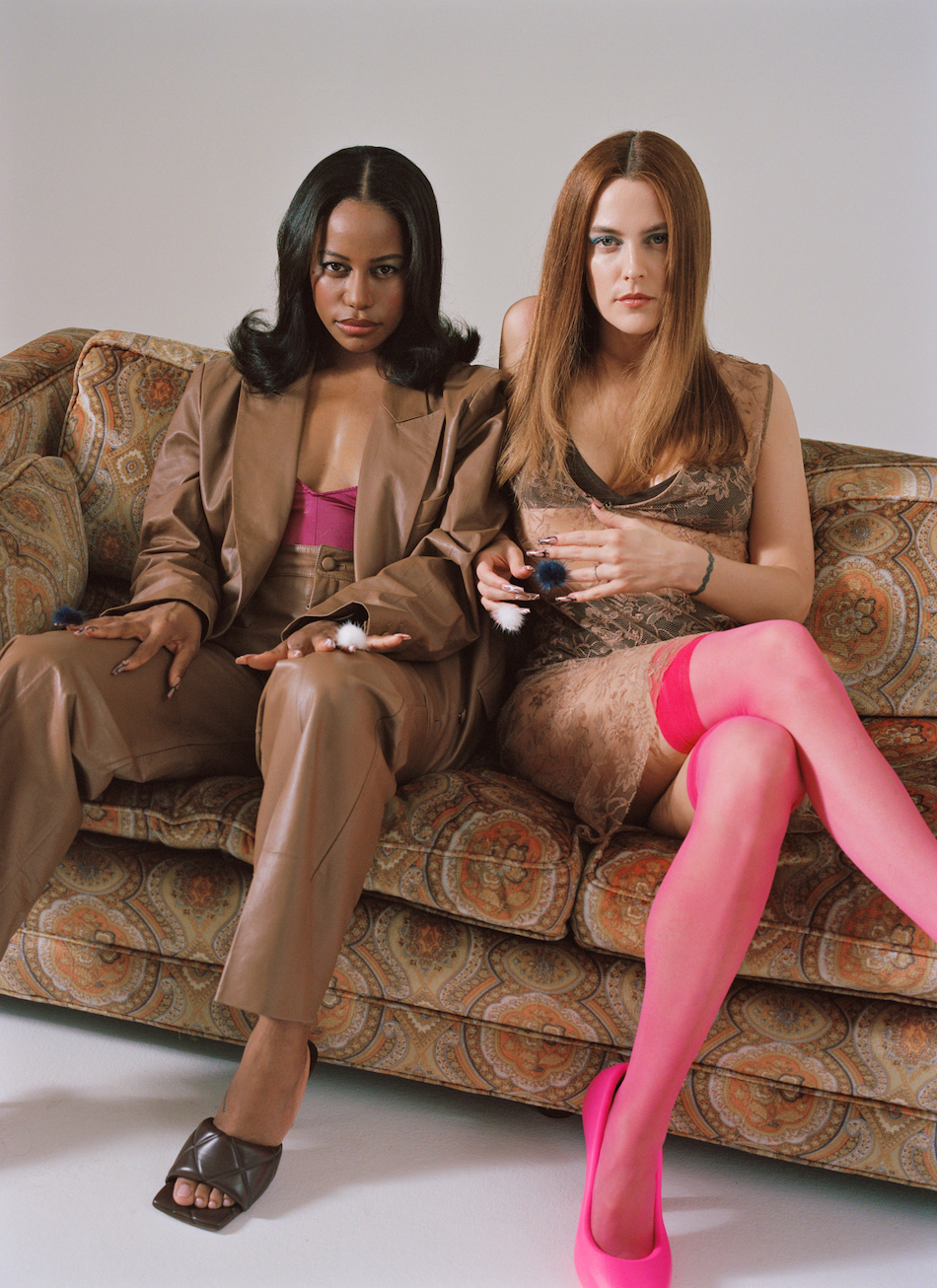
Sienna Fekete: How would you describe Zola to someone with no context?
Riley Keough: A wild and crazy trip to hell.
Taylour Paige: A modern Odyssey.
RK: A Thotyssey.
TP: Yes, a Thotyssey. It’s a stripping trip gone sour. You think you’re going up on the pole but you’re not coming down.
RK: You’re stripping and tripping.
SF: I love that. So y’all didn’t know each other before the film? You’d never be able to tell.
TP: We knew each other but not physically. We met on set.
SF: So how did you guys build that chemistry so seamlessly?
RK: Well, we became friends very fast. We really hit off in a way that I’ve never experienced in my adult life. I’ve made friends before but not best friends. And of course that helps the performance too because you’re more comfortable with each other.
TP: Yeah. We did a lot of trust falls in our hotel, I’d be like, “Come on, just fall. I got you.” And she was like, “Are you sure?” I’m sure. And then we’d weep. But that’s what we’d do. We had a meeting of souls and minds. I’m probably the more outgoing one and she’s more of the observer, we do think and go through the world extremely similarly. And I never had someone articulate my thoughts as clearly as she does and then as that relationship was expanding, it just made the chemistry of these enemies feel even more intense. I just felt really safe to go there because we were able to go there in our personal lives.
RK: Yeah. And the more comfortable you are with somebody, the more you’re able to go to both dark and light places because you’re in a space where you’re being supported.
TP: It was refreshing on set to be like, “Whoa, you’re really honest.” All we were trying to do with Zola is tell the truth as much as we could knowing the story existed as hyperbole. We’re lying in service of the truth.
SF: Moving at the speed of trust is what that sounds like. How did you both go about getting into character? What were you listening to? What were you watching? What were you wearing to bring them out and honor them?
RK: Well, for me like a lot of Stefani’s character was already on the page. Janicza and Jeremy had written a very solid character. The groundwork was laid in a really great way. We had to make choices, and one of the choices was how far to go with it. Janicza and I both wanted to go as far we could, and Janicza really wanted to go far. She wanted to go full demon and so we did. Stefani is a character that is based on Aziah’s tweets. So that’s what was most important to me, to play the girl that Zola experienced as opposed to basing it off a person. Sometimes it’s harder for me to play real people. Because when you meet them, there is that pause of, “Wait, I wasn’t going to do it like that.”
TP: That’s how I felt.
RK: It’s a little mindfuck because you have to honor their mannerisms and their personality, but you also want to be free to create this character. It’s less stressful for me not having a blueprint.
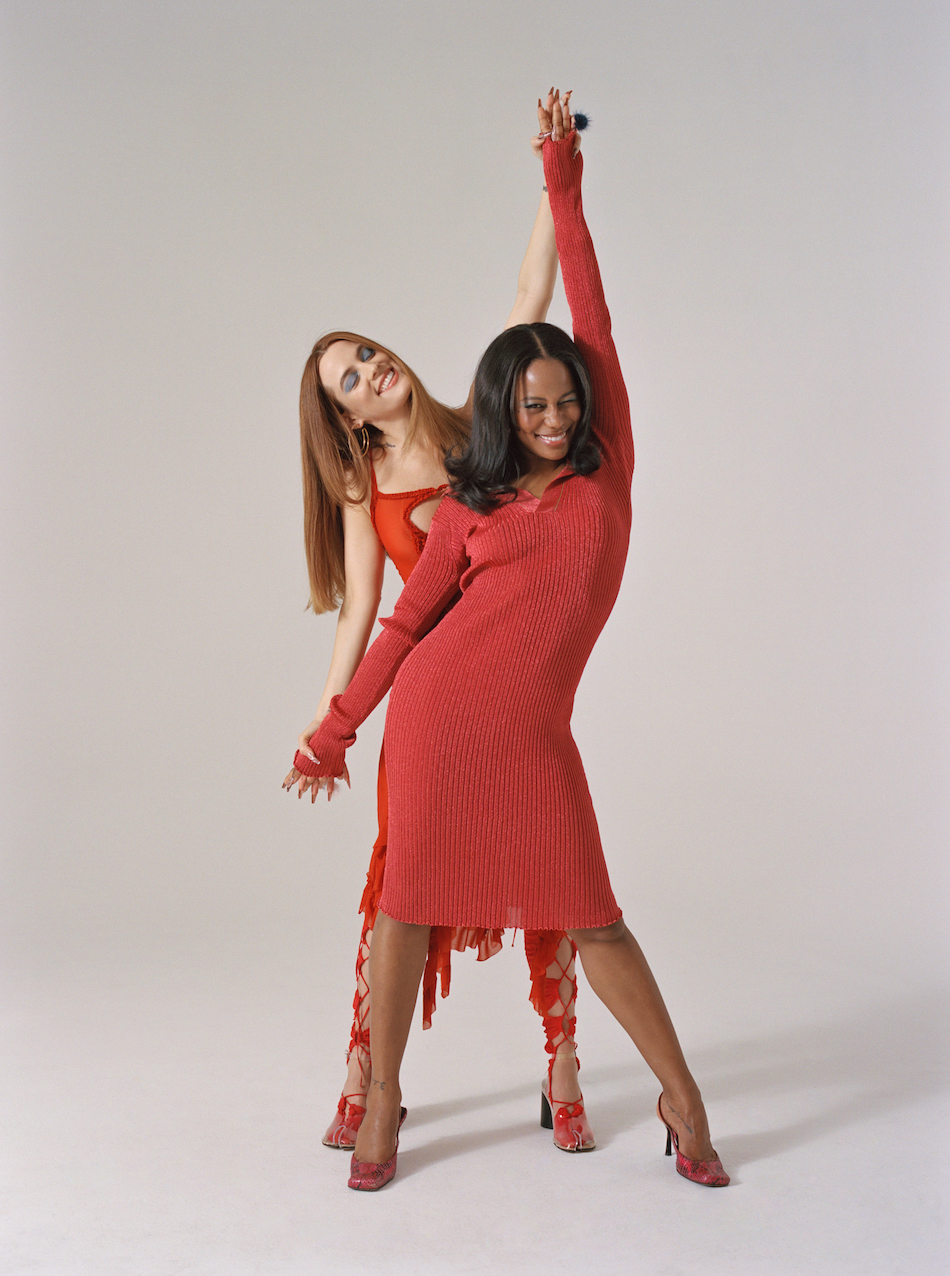
TP: Back in 2018, when I knew I was doing the role of Zola, there were only a couple interviews that I could find. She was a social media presence but she didn’t have a lot of videos out yet. So my best prep was just talking to her and asking her how she felt and trying to get into the spirit of things and having to surrender to not having video. I remember I reached out to Aziah to say, “I’m auditioning to play you tomorrow.” It was a way to ask for her blessing. When she finally saw the film, and said, “Bitch, I cried. You did that. You’ve had a fan in me since day one, you’re so me it hurts,” I felt we got there.
SF: It must have been such a relief to get her stamp of approval.
TP: It was such a relief. I was scared because she’s obviously such a force. We’re all here because of her brain. The way she processes, she’s just brilliant. A really big soul, you know?
SF: It definitely translates. Taylour, I know you are already a dancer and you come from that world so that transition into the strip club world must have been seamless. What was that experience like, to totally embody that physicality and confidence?
TP: It was liberating because you’re undoing shit from childhood and different relationships that suck out your sense of security. I’ve gone through the world very self-conscious about my body, and being a dancer doesn’t help. It actually doesn’t help at all. It makes you a perfectionist. And for this, I just wanted to throw that shit out, so that’s why I did work at the strip club because I was not trying to look like a ballerina. The women that I talked to, the ones I gravitated to were women who commanded the stage and were in their bodies. And it’s not even on some poetic shit. They just get your attention the way they clap their heels, the way they walk, and it was just a relaxed nature like, “I’m that bitch. I do what I gotta do, and I go home.” It’s a job. It’s strategy.
And then there were girls in there that were doing crazy tricks, gymnastics and all that, like FKA Twigs and that’s not what I wanted. No shade to her. I just mean like—
RK: You didn’t want to look like as trained as you are.
Fekete: Did you do the same, Riley?
RK: I didn’t but this is my third time playing a stripper. So I’ve been in the strip clubs many times and I’ve taken pole-dancing many times and, um, I had done it before a few times. I’ve done it a few times, but also in the script there was like a note that, I don’t know if it translates to the film, but about Stefani not being necessarily a great dancer. I’ve leaned into that. They wanted her to kind of move more lazy, and Janicza said the same thing. The focus was on how great Zola is and not how lazy Stefani is.
SF: I love the contrast. What was it like working with Janicza and Jeremy? What was it like having their guidance on set?
TP: It was just disgusting, we hated it [sarcastically]. It was great. They’re both genius minds that work really fast and pay attention to detail. And like Riley said earlier, it was already on the page.
RK: There’s like the tiniest amount of improv but Janicza had done all the work. So really, we had to just step in.
TP: We just had to show up.
RK: But you know what? I’ll also say that a great director makes you feel that way. All the vision is there. Janicza knows what she wants. She’s a genius. And when you’re working with a genius like that, there’s a kind of ease that you get that you don’t always get with other filmmakers.
TP: So true. She has an intense attention to detail. For instance, she wanted our nails to embody our characters. She wanted for me to have little black hearts on my rounded nails, and for Riley, they were pointy so if she touched someone they would hurt them. She pays attention to the baby hairs. For instance I spent most of the movie wearing blue and it’s supposed to be like Dorothy going to Emerald City without being bullshit. She showed me like Deana Lawson photos of images that she specifically wanted to try to reenact, or this painting—I always forget the name. But just the way that she even went about explaining was like watching a Pablo Picasso at work. Wait, what is it called? I want to find it.
RK: The Garden of Delights?
TP: The Garden of Earthly Delights. And it exists in three panels. The first is heaven, the second is purgatory and the third is hell. It looks chaotic and also fun and also like “What the fuck is going on?” I just want readers to know the amount of detail that went into crafting this film.
RK: Yeah. The only other director I’ve worked with that does that was George Miller for Mad Max. And it was a similar thing where it’s like there’s not one thing in the frame that doesn’t have a reason to be there. It’s not like “I guess just make the wall yellow. Or “Wear whatever color socks you want.” There’s none of that. Everything was specific including our bikinis when we’re doing the first strip scene together and we were barely wearing anything, pretty much like pasties with straps, but it’s actually yellow plaid and white. It’s Cher and Dionne, an homage to Clueless.
SF: Oh my God.
RK: It’s like the plaid that Cher and Dionne wear but like in these tiny nipple pasties.
SF: Oh my God. Yeah.
TP: Our movie could be broken down. There could be a class on it.
SF: When this was actually happening in 2015, were y’all following that Twitter thread? What was your relationship to Twitter prior to this role?
RK: I didn’t necessarily have a crazy relationship with Twitter, but I had read the Twitter thread in real-time when it was happening. I’m not somebody that would normally like spend a lot of time on social media but I couldn’t stop, I found it totally compelling. I read the whole thing in, you know, a short amount of time like everybody else, which is why it went viral. You can’t stop once you start. Her voice and storytelling is so compelling that you’re there with her.
TP: I mean I am in Florida.
RK: But I don’t think you read it in real time?
TP: No I didn’t. I’d been on Twitter for a while but I didn’t even understand it at first. I remember I had some friends who were like, “Just get on it, it’s fun.” But I would always, not to be cheesy, but I just used to post like positive shit and log out. I just never been like a scroller. But then once I found out I was auditioning I wanted to obviously do more research, so I did and I was like, “Holy fuck. This is iconic.”
SF: Yeah, Twitter’s kind of wild.
TP: It’s chaotic. It’s too much. It’s a lot of thoughts.
RK: It’s a lot when you’re a very sensitive person like we are. Twitter is risky. So I dip in and out too. I don’t really spend a lot of time on Twitter.
TP: Twitter will have you spiraling. And you know it can be really funny and entertaining, but we all have our own relationships with social media, but I do find that because it’s such a natural thing to do when you’re bored I’m always asking, “What else could I be doing if I wasn’t bored?” We get so caught up in the loop so I’m always trying to remember to be mindful.
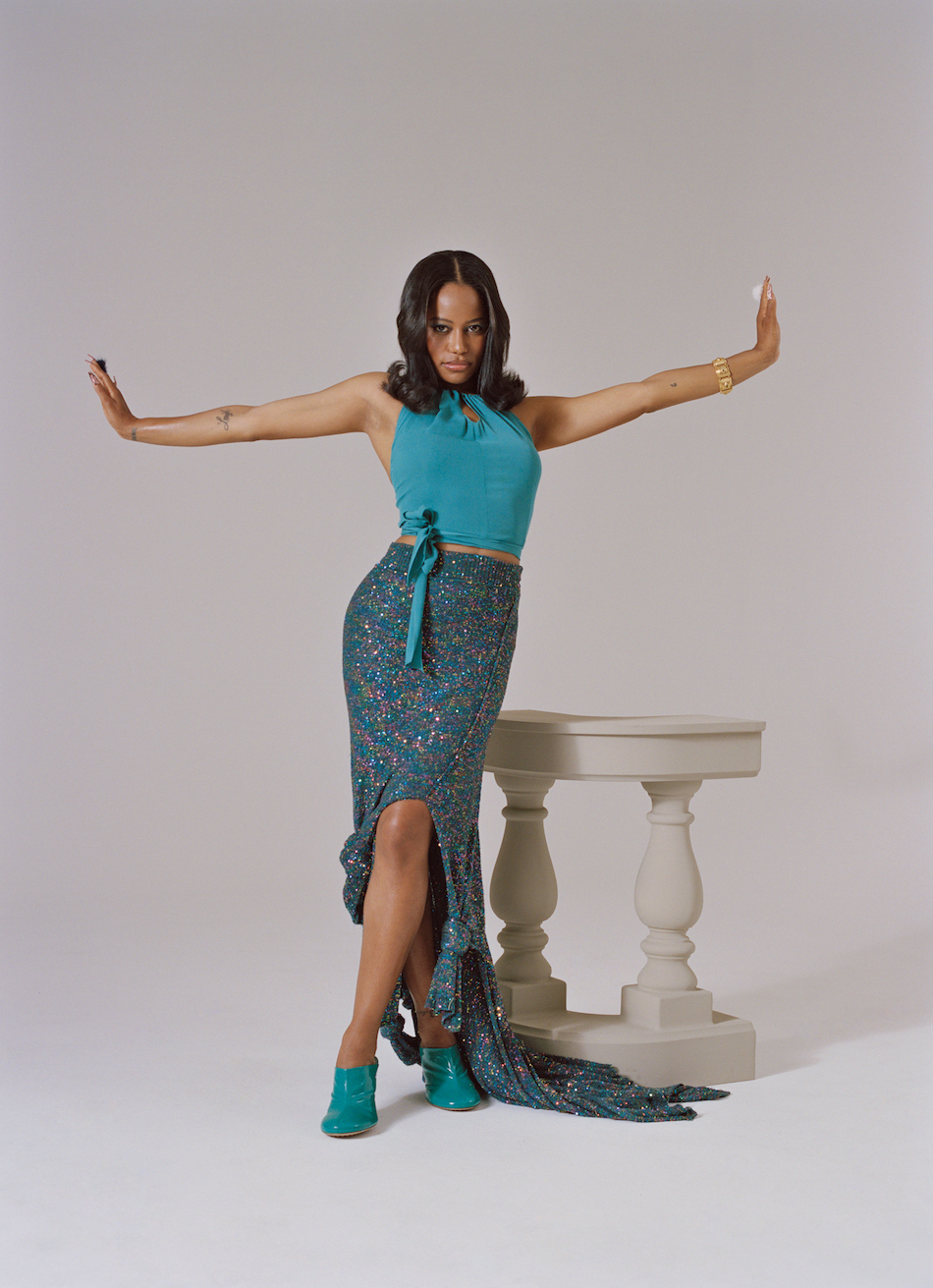
SF: I feel the same exact way. I’m curious. What is your favorite type of role to play?
RK: My thing always is—
TP: You like to be a ho.
RK: Oh my God.
TP: But you are.
RK: I just love doing something I’ve never done before.
TP: Yes.
RK: So, for me, it’s like, “Okay, I haven’t done this and I haven’t done this.” I’ve played sex workers a few times but they’re so—
TP: Different.
RK: Vastly different.
TP: She always understands the assignment. We all know this.
RK: Thank you.
TP: Yeah, I took that from Twitter.
RK: Maybe that was a tweet.
TP: But she does.
RK: I think it’s just that I don’t want to do the same thing over and over again.
TP: Mm-hmm.
RK: And, it’s funny, I’ve played Southern characters a few times but from totally different regions, totally different accents, different people. I like things that feel challenging. I want to do something that’s—
TP: A stretch.
RK: Yes, I want to grow and try new things.
TP: My whole thing is keeping my life colorful. Even with this role I felt like, “Okay, I don’t know if I can do this.” But I felt like something in me, even on a subconscious level was ready to let go of that self-conscious nature. There was a certain amount of: What’s meant for you, doesn’t miss you. I’m always just like, “What’s the next thing that will expand me and deepen my capacity for empathy and understanding of the human.” Because when you break it down and you’re like, “Oh, that’s why this person’s evil,” or, “What happened to them when they—” I just feel like more connected to it all.
RK: I think that that’s such an amazing thing about film, that there’s always empathy. You’re finding empathy for these characters that you in your everyday life would never find empathy for.
TP: Totally agree.
RK: And as an actor, it’s also your job when you’re playing a character to find empathy and to make it human. There’s a real practice in, “Okay, I’m playing this demon but I need to find empathy for her.”
TP: And when have I been a demon, maybe?
RK: Totally and just finding love for the characters you’re playing and then applying that to life. I think that’s what film is amazing at. And if it’s really well-written, the villains are complicated and they’re not just good or bad. They’re new, they’re human; they have hearts and children. You know what I mean?
TP: It’s infinite empathy.
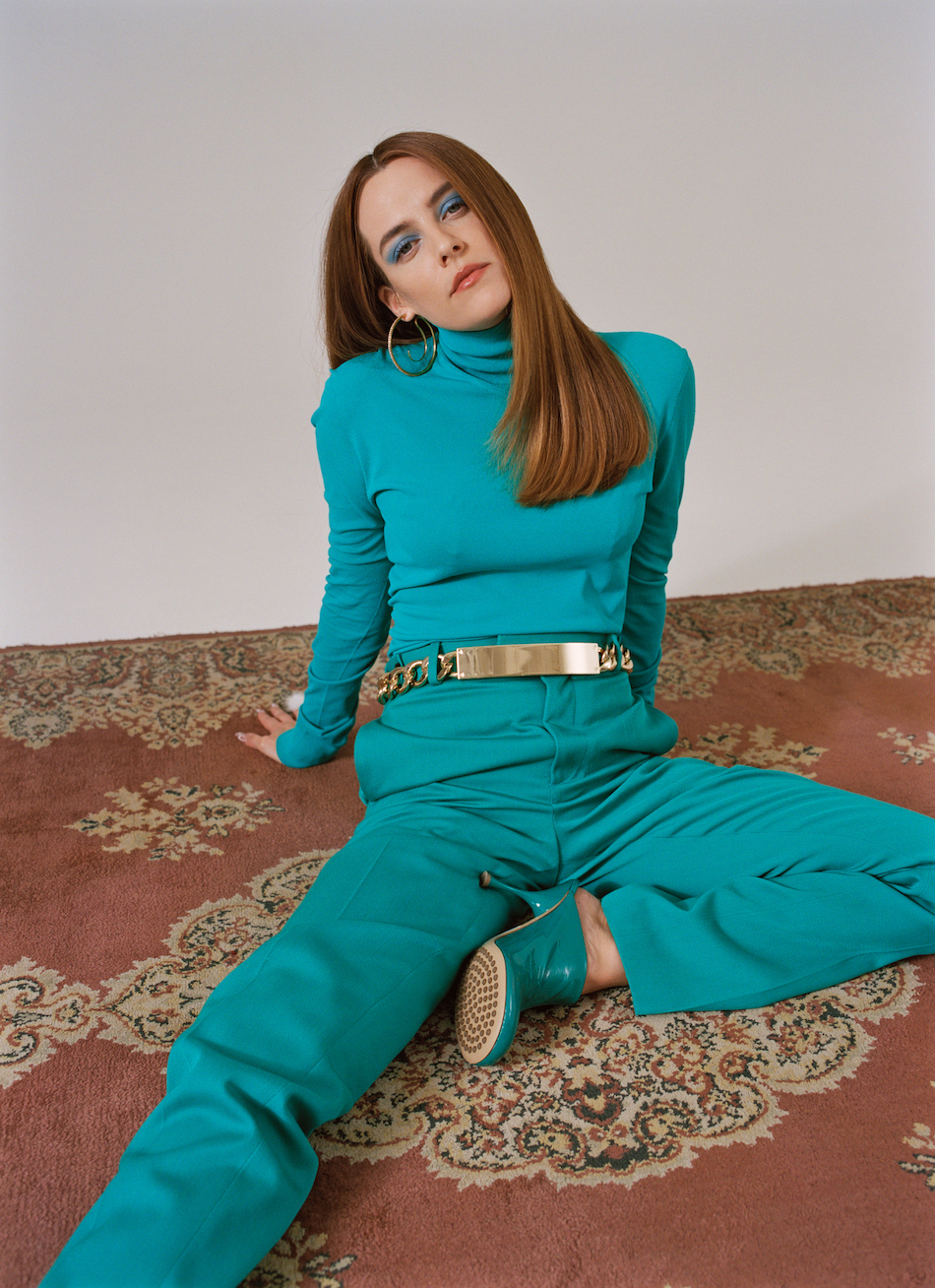
SF: I love that. Who are currently your dream collaborators or biggest sources of inspiration?
RK: My biggest sources of inspiration are my loved ones like my sisters, my family, my husband, Taylour, my best friends. I’m so lucky that I’m in a group of people that are constantly trying to grow and be kinder. I feel so grateful that I’m in a circle of people who are really trying their best to be love. As far as collaborators I have realized I love working with people that I love and like being around, so my dream collaborations are spaces like Zola. It was a dream just being around good people.
Honestly it’s a priority for me at this point in my life. Of course we want to make good art as well, but when it’s coming from love, like Taylour always says, it’s going to be good.
TP: Honestly, I can’t really top that. I agree. We both try to live in a way that we can have the opportunity to be in environments of freedom for everybody. Even in our work, we ask, “How can I get more free?” And also, “How can I be a part of like freeing consciousness?”
And also I am also going to put her on the spot and say she’s one of my biggest expanders and inspirations. This woman has been through hell and has experienced extreme grief and sadness and still radiates such compassion and love and understanding and is always doing the work. It makes me want to cry. She’s experienced the hardest year of her life and still smiles and hugs and wants to sit with you. And it’s immeasurable. Those are the kind of people I really want to collaborate with in life because shit is fucked up sometimes.
RK: Yeah, I think Taylour also—
TP: You don’t have to do that.
RK: No, I was just going to say, you’re spot on and that life is hard enough. In life and in work, I want to be surrounded by people who are a relief from the pain and struggles.
SF: We’re all just trying to hold each other close, and feel that love and support absolutely. What projects are y’all excited about for the future? Anything creatively you’re not under contract to not be able to talk about?
TP: I’m headed to Bulgaria on June 13 to go work with Peter Dinklage and some other people. I’m terrified, but I’m also like, “Okay, this is the next part of my soul’s journey.”
And I did a movie with Lena Dunham in December that was super secretive. And she is just a dream and has also become a very close friend of mine now. She’s in London, but we talk all the time about life, love, this whole thing. It’s just been really nice to feel seen by people that you look up to, and when they see something in you that you don’t even see in yourself. I’m kind of just rolling with it. We’ll see what happens. And you’re going to do Daisy.
RK: Yeah, I’m doing an Amazon show. We start really soon. It’s called Daisy Jones & The Six and it’s like a ’70s rock and roll band, which is going to be super fun. I just read the book, and it just makes you feel happy. And that’s what I want to contribute to the world right now. You know, like, I want people to feel like this is an escape.
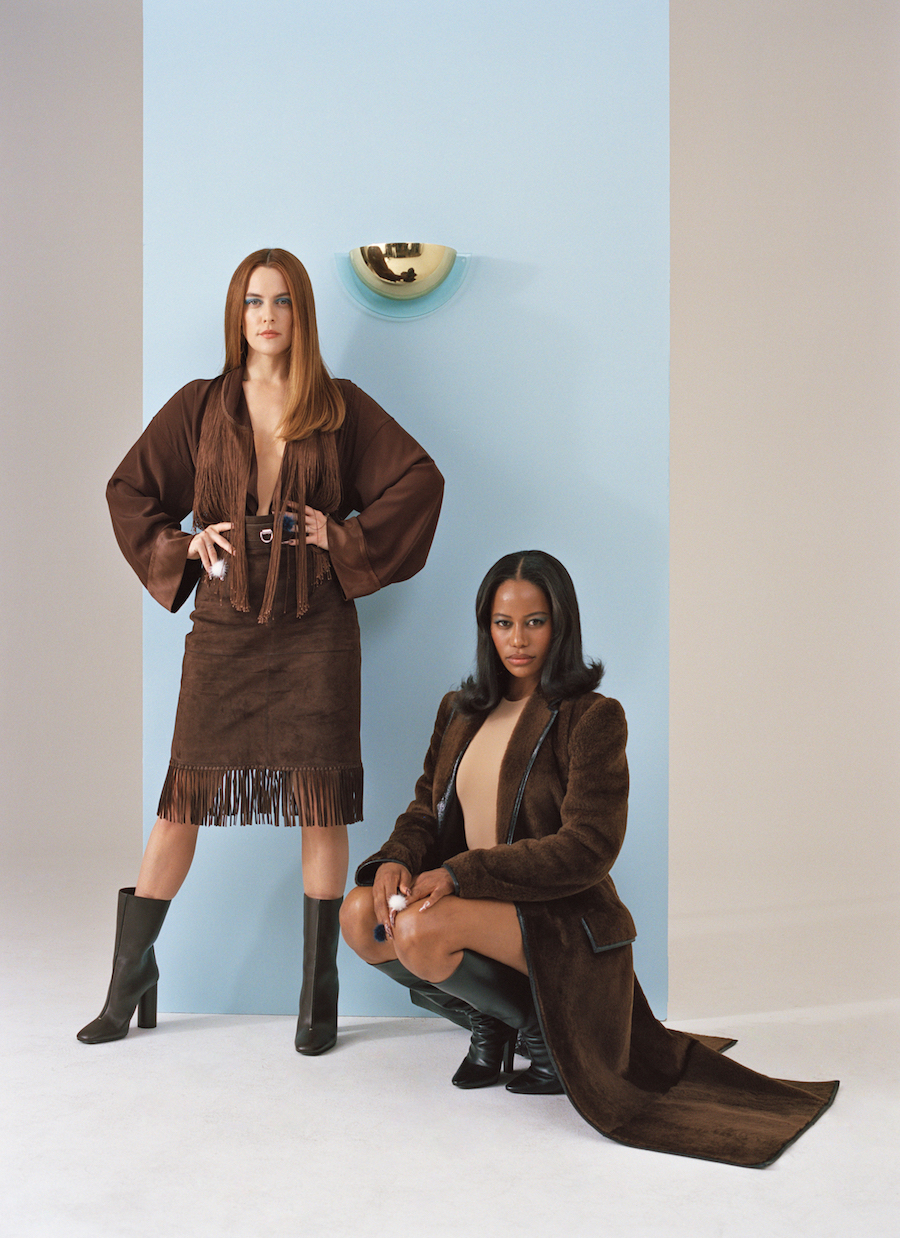
SF: What’s a secret or something fun about yourself that you think your fans or the public wouldn’t necessarily know?
TP: Well, it wouldn’t be a secret if I told you.
SF: True! Yeah, maybe just something people wouldn’t know about you, or even like something about each other that you feel like is really special that doesn’t publicly translate.
TP: Well, I can speak for her. Everyone might have their own presumptions of someone who’s like the granddaughter of whoever—What’s his name again? And who also is like the stepchild of—Who’s the other guy? But she is the most grounded, down to earth, truth seeker. Most people just go, “Oh, Elvis Presley. What are your issues?” But in fact they get exacerbated because you’re growing and healing and dealing with shit in front of the entire world. And that’s bizarre.
RK: Now onto Taylour, I think that what’s amazing about Taylour is actually that she is so authentically herself in every situation. It’s what you see is what you get in a really beautiful way. I’ve had interviews where I’m in a weird mood, that are not totally reflective of who I am. Taylour no matter the weather, no matter the day, no matter the time, is a light shining.
TP: That is not true. I can be a fucking dark-ass clown.
RK: Of course, we can all have different moods, but she’s just one of those people who when she walks in the room and she starts talking, everyone feels better.
TP: Aw, sis.
RK: It’s true. She leaves the space with love. And that’s what we should all strive to do.
Craving more culture? Sign up to receive the Cultured newsletter, a biweekly guide to what’s new and what’s next in art, architecture, design and more.



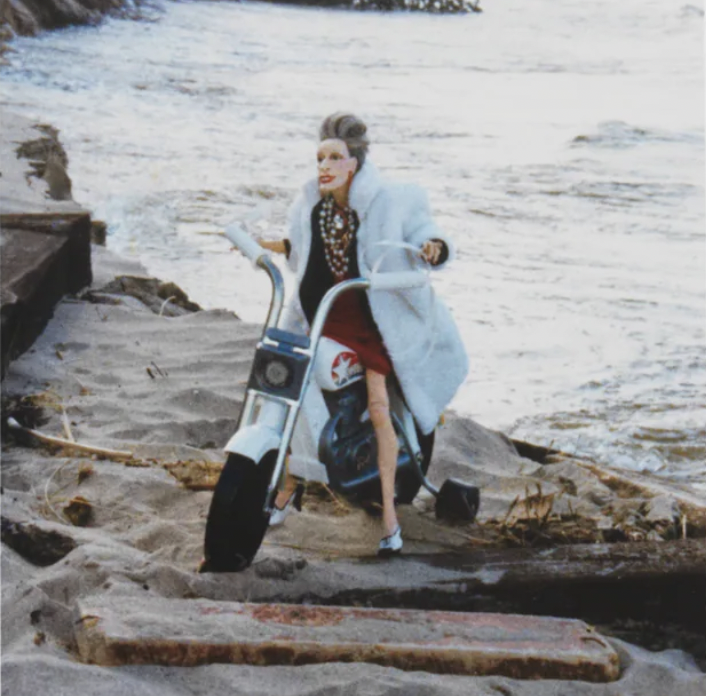


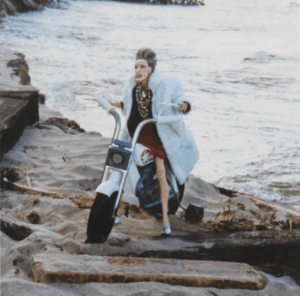



 in your life?
in your life?

